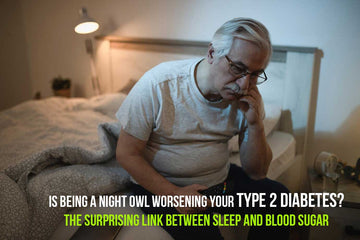Is Being a Night Owl Worsening Your Type 2 Diabetes? The Surprising Link Between Sleep and Blood Sugar
by Jyotsana Arya on Sep 13, 2024

The Impact of Sleep on Type 2 Diabetes
Our bodies rely on a delicate balance of hormones, nutrients, and lifestyle factors to function optimally. One of the most overlooked aspects of health is sleep, especially for those managing type 2 diabetes. Recent research has shed light on a surprising connection between sleep patterns and blood sugar control, indicating that people who identify as night owls may be more at risk of worsening their condition.
For many individuals, staying up late into the night has become a habit due to modern work schedules, entertainment, or lifestyle choices. However, this shift in circadian rhythm can have a profound effect on insulin sensitivity and blood glucose levels, leading to potential complications for those with type 2 diabetes.
How Sleep Patterns Affect Blood Sugar Levels
Our sleep patterns are governed by the body's internal clock, or circadian rhythm, which regulates various biological processes, including metabolism. When we deviate from a normal sleep-wake cycle, it can disrupt the body's ability to regulate glucose levels.
Studies have found that individuals who sleep irregularly or experience sleep deprivation often face:
- Insulin resistance: The body's cells become less responsive to insulin, causing higher blood sugar levels.
- Increased hunger and cravings: Lack of sleep can lead to increased production of ghrelin, the hormone responsible for hunger, and decreased levels of leptin, the hormone that signals fullness. This combination can result in overeating and weight gain.
- Increased cortisol levels: Stress hormones like cortisol rise with poor sleep, which can also contribute to elevated blood sugar levels.
For night owls, the alignment of their sleep schedule with natural circadian rhythms is thrown off, making it more difficult to manage blood sugar fluctuations throughout the day.
The Link Between Circadian Rhythm and Insulin Sensitivity
Our bodies are designed to follow a 24-hour cycle, and key metabolic processes, such as insulin production, are synchronized with this clock. During the day, insulin sensitivity is generally higher, meaning our cells are better equipped to process glucose. As evening approaches, our insulin sensitivity begins to decrease, making it harder to control blood sugar spikes after meals.
Night owls, who stay up late and sleep during the day, experience a shift in this natural rhythm. This shift leads to:
- Delayed insulin response: Because their bodies are functioning against the natural biological clock, night owls may experience slower insulin responses after meals.
- Higher blood sugar levels at night: When they eat late, their bodies are less efficient at processing glucose, leading to higher blood sugar levels.
- Disrupted fasting glucose levels: The combination of late-night meals and irregular sleep schedules often results in elevated fasting glucose levels, which is a key marker for worsening diabetes control.
Why Night Owls Are at Higher Risk for Type 2 Diabetes Complications
There is compelling evidence that night owls are at higher risk of experiencing complications related to type 2 diabetes. This is due to several factors related to their lifestyle and sleeping habits.
-
Increased Risk of Obesity: Individuals who stay up late are more likely to snack during the night, leading to weight gain. Obesity is a well-known risk factor for type 2 diabetes, as excess fat interferes with insulin regulation.
-
Poor Dietary Choices: Studies have shown that night owls tend to make poorer food choices, opting for high-calorie, carbohydrate-heavy meals. These foods can cause blood sugar levels to spike, making it harder to control diabetes.
-
Lack of Exercise: Those who sleep late and wake up late often miss the opportunity to engage in physical activity during the day. Exercise is crucial for managing diabetes, as it helps to improve insulin sensitivity and lower blood sugar levels.
-
Chronic Sleep Deprivation: Over time, staying up late can lead to chronic sleep deprivation, which exacerbates insulin resistance and worsens blood sugar control. Sleep-deprived individuals are more likely to experience fatigue, which further discourages healthy habits like regular exercise and meal planning.
The Role of Melatonin and Night Owls
Melatonin, a hormone produced by the pineal gland, plays a key role in regulating our sleep-wake cycle. For night owls, melatonin production is delayed, which further disrupts their internal body clock.
Research has shown that melatonin affects the secretion of insulin, which is why those who stay up late may struggle with blood sugar regulation. High melatonin levels at night can inhibit insulin release, leading to elevated blood sugar. Additionally, those with diabetes may already have altered melatonin production, further complicating their ability to maintain stable glucose levels.
Improving Sleep Habits for Better Diabetes Management
If you are a night owl and managing type 2 diabetes, improving your sleep hygiene can make a significant difference in your blood sugar control. Here are several strategies to align your sleep schedule with your circadian rhythm:
-
Establish a Consistent Sleep Schedule: Aim to go to bed and wake up at the same time every day, even on weekends. This consistency helps regulate your body's internal clock.
-
Avoid Late-Night Meals: Eating large meals late in the evening can disrupt your body's ability to regulate glucose. Aim to have dinner at least 3 hours before bedtime.
-
Create a Relaxing Bedtime Routine: Incorporate relaxing activities like reading, meditation, or taking a warm bath to signal to your body that it’s time to wind down. Avoid exposure to blue light from phones or computers, as this can delay melatonin production.
-
Increase Daytime Activity: Regular exercise can improve insulin sensitivity and help stabilize blood sugar levels. Try to engage in physical activity earlier in the day rather than late at night.
-
Limit Caffeine and Sugar Intake: These stimulants can interfere with your ability to fall asleep and may lead to blood sugar spikes.
Conclusion: The Importance of Prioritizing Sleep
The connection between sleep and type 2 diabetes is undeniable. For those who identify as night owls, the risks of insulin resistance, elevated blood sugar, and worsening diabetes control are higher. By prioritizing a healthier sleep schedule, making better dietary choices, and incorporating regular physical activity, night owls can mitigate these risks and improve their overall health.
Night owl and diabetes, sleep patterns and blood sugar, circadian rhythm and insulin resistance, type 2 diabetes sleep impact, blood sugar control at night, melatonin and insulin, managing diabetes through sleep, sleep deprivation and diabetes, diabetes complications from poor sleep, how sleep affects type 2 diabetes.



